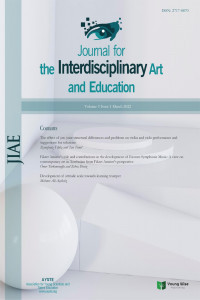The relation of healthy breath and vocal training success
The relation of healthy breath and vocal training success
Breathing is the first activity and the need of the humans from that moment they are born. We can survive several days without eating or drinking yet we can spend only a few minutes without breathing. Particularly in this day and age, that is during Covid-19 pandemic, it has become difficult to breathe in behind our masks. The breaths we take have been insufficient for us making it hard to trepopnea. Perhaps, just because of the masks we have been wearing, the process of breathing has started to deteriorate, become unstable and disorganized. We have once again and thoroughly understood how important it is to breath. Breathing = Life! Healthy breath provides us with self control over our bodies. Realizing how much it affects our brain, psychology, body and ability, how even singing affects the healing power of respiratory health will change our lives considerably. This article has been written for all of us, especially the young generation, on the purpose of raising awareness. The importance and effects of breathing in and breathing out process, which is natural, reflexive for each individual have been mentioned. Essential data to make our lives much more efficient and effective are presented with taking an effective and practical route to breathing healthily.
Keywords:
breath, body health, body awareness, respiration health deep breathing,
___
- Acar, N. (2016). Breath of Use and Vocal Training. Ulakbilge, 4(8), 231-246.
- Altenmuller, E., Schlaug, G. (2015). Apollo’s gift: new aspects of neurologic music therapy, Progress in Brain Research, 241.
- Bordoni B, Purgol S, Bizzarri A, et al. (June 01, 2018) The Influence of Breathing on the Central Nervous System. Cureus, 10(6), 5.
- Davran, Y. (1997). A history of the art of singing. Ankara: Evrensel Müzikevi.
- Edwards, S. (2005). A psychology of breathing methods. International Journal of Mental Health Promotion, 7(4), 28-34.
- Garothe, M.L. (2007) Pranayama, The Science of Breath, Theory and Guidelines for Practice, 8.
- Gul, G. (2018). Music Teachers' Usage of the Breathing and Voice Exercises in Song Teaching, Journal of Education and Training Studies, 6(9), 70.
- Guz, A. (1997). Brain, breathing and breathlessness. Respiration Physiology, 109, 197-204.
- İşsever, İ. (2017). The Respiration and the Management of Breathing in Voice Training. The Journal of Social Science, 4(16),365-375.
- Keitz, M., Martin-Soelch, C.,Leenders, K.L., (2003). Reward processing in the brain: a prerequisite for movement preparation? Neural Plast, 1, 121-128.
- Loehr, J.E. and Migden, J.A. (1999). Breathe in, breathe out. Alexandra, Virginia: True Life Books.
- Mutlu, Y. Y., & Karakelle, S. (2017). Musıcal Development Characteristics of Primary Education Students and Music Education, Uluslararası Sosyal Araştırmalar Dergisi, 48(10), 494-500.
- Novotny, S., & Kravitz, L. (2007). The science of breathing. IDEA Fitness Journal, 4(2), 36-43.
- Öztürk, G. F., & Akgün, G. (2007). Voice Education and 3R Rule. Kastamonu Eğitim Dergisi, 15(1), 423-426. http://www.kefdergi.com/pdf/15_1/423.pdf
- Phillips, K. H., & Vispoel, W. P. (1990). The effects of class voice and breath-management instruction on vocal knowledge, attitudes, and vocal performance among elementary education majors. The Quarterly Journal of Music Teaching and Learning, 1, 96–105.
- Phillips, K., Edwin, R., & Williams, J. (2011). Supplemental Singing Exercises, Supplement to the Oxford Handbook of Music Education. https://www.robertedwinstudio.com/supplemental-singing-exercises.php
- Rauduvaite, A., Lasauskiene, J., Abramauskiene, J., & Chuang, M. J. (2017). Children’s Singing: Reflections on a Vocal Teaching in Lithuania and Taiwan, International Journal of Social Sciences, 3(1), 853-869.
- Reid, D (1998). Harnessing the power of the universe. London: Simon and Schuster.
- Sunitha. G., & Ravi. B. N. (2013). Effect of Deep Breathing on Respiratory Parameters in Healthy Young Individuals, Journal of Evolution of Medical and Dental Sciences, 2(19), 3306.
- Silva,P. (2017). Singing for Lung Health: How Singing Can Improve Your Breathing. Retriewed from: https://pulmonaryhypertensionnews.com/2017/08/09/singing-for-lung-health-how-can-singing-improve-your-breathing/
- Taub-Bynum, E.B. (1984). The family unconscious. Wheaton, Ill: Quest Books.
- Welch, G. (2012). The Benefits of Singing for Children, The physical, psychological, social, musical and educational benefits of singing, 1.
- Yiğit, N. (2006). Effects of choral sound education studies on children's sound development. Selçuk Üniversitesi Sosyal Bilimler Enstitüsü Dergisi, 16, 777-783. dergisosyalbil.selcuk.edu.tr/susbed/article/download/559/539
- Yayın Aralığı: Yılda 4 Sayı
- Başlangıç: 2020
- Yayıncı: Genç Bilge Yayıncılık
